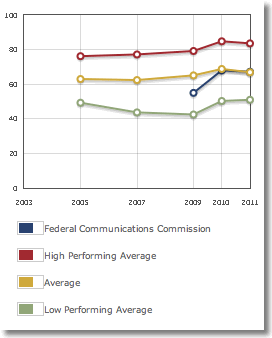2011 Best Places to Work in the Federal Government Report
The annual Best Places to Work in the Federal Government report has been a recurring theme here. The Partnership for Public Service uses data from the Office of Personnel Management's Federal Employee Viewpoint Survey to rank agencies and their subcomponents according to a Best Places to Work index score. Agencies and subcomponents are not only measured on overall employee satisfaction, but are scored in 10 workplace categories, such as effective leadership, employee skills/mission match, pay and work/life balance.
FCC avoided the survey in 2003-2007, but has participated in 2009-20011. This year FCC ranked 17th out of 32 small agencies. In the 2009 survey, based on data collected in 2008 under FCC Chairman Martin, FCC ranked 28th out of 32 “small agencies” and was lower than all but 25 out of the 278 organizations surveyed. But in 2010, FCC was justifiably proud of being “most improved agency in the Federal Government” .
As shown in the chart at left, FCC is still in the average zone for small agencies. I suspect one factor is the lack of stability and continuity for top managers at FCC compared to other agencies. For decades FCC has lacked a top tier of senior civil servants who survived presidential and chairman transitions. (The Mark Fowler to Al Sikes transition was one of the “bloodiest” for senior managers even though the Reagan remained President.)
The reasons for the senior management changes are complex and there is fault on both the 8th Floor political level and the many of the career civil servants who do not act like nonpartisan “British civil servants” as they rise in their career, but rather tend to pander to the political crowds. Bob Pepper was a notable exception serving high positions at FCC under 6 chairmen of both parties. That is truly rare now. But this type of continuity is essential to bridge the gap between the 8th Floor and the staff and make FCC a more effective agency.





![Validate my RSS feed [Valid RSS]](valid-rss-rogers.png)

